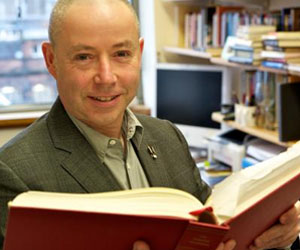QMUL Digital Humanities Lecture 2015
Books in space: hyper-dimensional reading
Professor Jonathan Hope (Strathclyde)
April 29th 2015, 5:30pm Arts Two Lecture Theatre
Watch the Lecture
Download Poster // Download E-Invite
Digital tools allow us to ‘read’ vastly more text than any human could manage in a lifetime. They also allow us to make comparisons between texts, genres, and periods based on projections of those books into multi-dimensional spaces. Some have hailed the advent of ‘culturomics’ – but what kind of ‘reading’ is this, and how can we ‘read’ spaces which are beyond the imaginative capacity of human minds? I’ll consider the promise, and the opportunities, of digital methods applied to large collections of texts – and I’ll also consider how these tools and methods might change the nature of our object of study. Most of my examples will be drawn from Shakespeare and the Early Modern period.
 Jonathan Hope is Professor of Literary Linguistics at Strathclyde University in Glasgow. His research has consistently attempted to bring insights and techniques from linguistics to bear on literature. He has published Shakespeare’s Grammar, a systematic descriptive grammar of Shakespeare’s language, aimed at editors and literary scholars, and Shakespeare and Language, which represents the next step in this process, as it attempts to historicise concepts of language (now and in Shakespeare’s time).
Jonathan Hope is Professor of Literary Linguistics at Strathclyde University in Glasgow. His research has consistently attempted to bring insights and techniques from linguistics to bear on literature. He has published Shakespeare’s Grammar, a systematic descriptive grammar of Shakespeare’s language, aimed at editors and literary scholars, and Shakespeare and Language, which represents the next step in this process, as it attempts to historicise concepts of language (now and in Shakespeare’s time).
In the Digital Humanities, he has been working since 2003 collaboratively with Michael Witmore and researchers at Carnegie Mellon University (Pittsburgh) and the University of Wisconsin-Madison in experimenting with the use of a computerised text analysis program, Docuscope, on Shakespeare’s texts. In 2012, he was invited by the Folger Shakespeare Library to direct a Summer Institute in Digital Humanities, funded by the NEH. The Institute brought together 20 Renaissance scholars, at varying stages of their careers, and with varying amounts of digital humanities experience, to the Folger for three weeks, to work with an outstanding group of visiting faculty on the practicalities and, most importantly, the theorisation of digital humanities in research into the Renaissance. The second iteration of this Institute will take place summer 2015.
His project, Visualising English Print brings together computer scientists and literary scholars as partners. It will break new ground in computational science, developing new techniques that better support humanist thinking. They aim to innovate in the literary sphere, showing how the introduction of computational thinking and the new tools they develop for applying it can be used to lead to new understandings of literature, language, and their development.